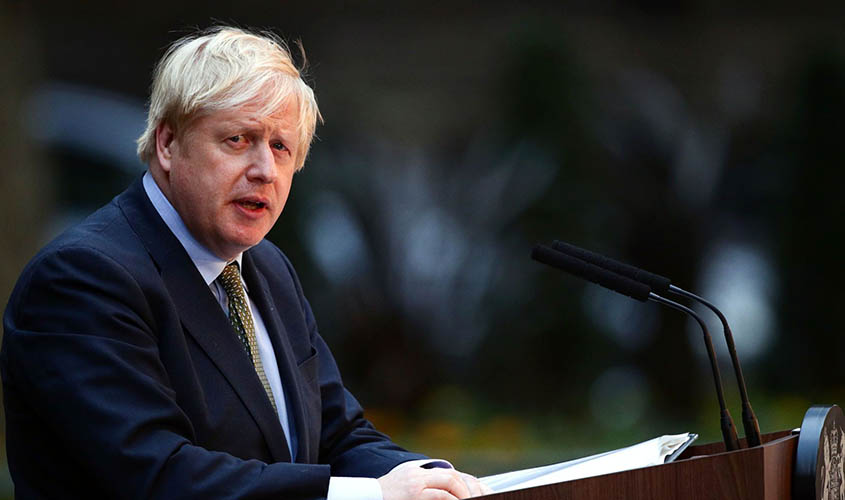Taking place post Brexit, this trip is of paramount significance.
London: UK Prime Minister Boris Johnson is scheduled to visit India on 26 April. The date is finalised, however there could be some uncertainty over circumstances related to Covid-19. The trip has been rescheduled once already as PM Johnson was invited to participate as chief guest at India’s Republic Day celebrations on 26 January but the trip was called off as Britain plunged into a lockdown with the surfacing of new virus strains.
The British Prime Minister is expected to invite his counterpart Prime Minister Narendra Modi to attend the G7 summit to be held in the UK in June. The invitation apparently will be extended personally from the Prime Minister to his counterpart and it will be an historic occasion in Cornwall when India joins the top global table.
GEOPOLITICAL TILT
Taking place post Brexit, this trip is of paramount significance. Downing Street has also announced that they intend to review their role and policies towards the Indo-Pacific region, what it calls the “tilt”. The central foreign policy shift will most certainly include an affirmative inclination towards the Indo-Pacific region and what is described as the new “geopolitical centre of the world” as we come out of the global pandemic. Britain’s Queen Elizabeth naval carrier will undertake its first operational deployment in the Indian Ocean Region alongside other NATO (North Atlantic Treaty Organization) allies. PM Johnson’s first foreign visit—to India—after departure from the EU, signifies the strength and the depth of the relationship he wants to forge in a post pandemic world. The UK is also actively applying to gain partner status in the prestigious Association of South Asian Nations and this could be a significant step when it comes to the Indian Ocean Region.
ENHANCED TRADE PARTNERSHIP
Britain is keen to negotiate and set up her own trade and commerce deals with other similar countries globally, especially who have democracy as their core value. A free trade agreement can be on the cards. However, some preparatory steps may have to be taken. The UK is India’s 14th largest trading partner and accounts for around USD 8.7 billion in exports and approximately USD 6.7 billion of imports as of 2020-2021. There is common understanding that a free trade agreement will be much smoother post Brexit as the European Union might have had some considerations and sensitivities
UK Foreign Secretary Dominic Raab met India’s External Affairs Minister S. Jaishankar in December 2020. Amongst other discussions there was a firm commitment from both parties to build a strong defence and security partnership in order to tackle common issues such as global terrorism and maritime security.
In February 2021, UK Secretary of State for International Trade, Elizabeth Truss met with the Indian Minister for Industry and Commerce, Piyush Goel and suggested an interim pact might be the missing piece of the jigsaw. There are multiple issues and concerns to non-tariff barriers which both India and UK have flagged and which can be overcome only by constructive conversation. The services sector is also a vital part of this discussion as both India and the UK are determined to give it the necessary boost.
Lord Tariq Ahmad, the Minister for South Asia in the UK Foreign, Commonwealth and Development Office (FCDO) has recently returned from his trip to India to add further steam to the forthcoming summit in February. It is vital that Britain partners with India to unlock the opportunities in the region and to finalise the long overdue India-UK Enhanced Trade Partnership (ETP).
FOUNDATION FORWARD
The foundation of this relationship is the common convergence of our shared values including our strength and most importantly our people. In the last decade probably Boris Johnson is the only Prime Minister who seriously believes in having a cordial and trustworthy relationship with India. This opportunity is perfect for Britain to partner with India and to complement each other in a synergising fashion. There has been a relative void in the last decade when it comes to anything substantive in India-UK relationship and perhaps the time has come to change the orientation. It is not in the best interests of Britain not to have a good relationship with India and this ignore 1.2 billion people. The moment is opportune for both democracies to partner with each other and by doing so Britain can significantly redefine her place in the evolving global framework.
Britain must also take into account a few of India’s concerns, particularly about miscreants who operate out of British soil using the shield of freedom of expression and speech to carry out their propaganda. Getting involved in the Indian Ocean Region actively will most certainly ensure Britain will get a significant direction towards international relationships and other policy related parameters. President Joe Biden has already started the initiative of the Quad, giving India a pivotal role in its agenda going ahead. Policymakers and think tanks in Britain should seize this opportunity to ensure PM Johnson is not left behind. Conservative Party leaders must come out in full support of their leader who is on a mission to ensure that a bright and a fruitful future for both countries is on the horizon. His sincere efforts should not go in vain.
Priyajit Debsarkar is author and geopolitical analyst, www.priyajit.co.uk, @PDebsarkar

